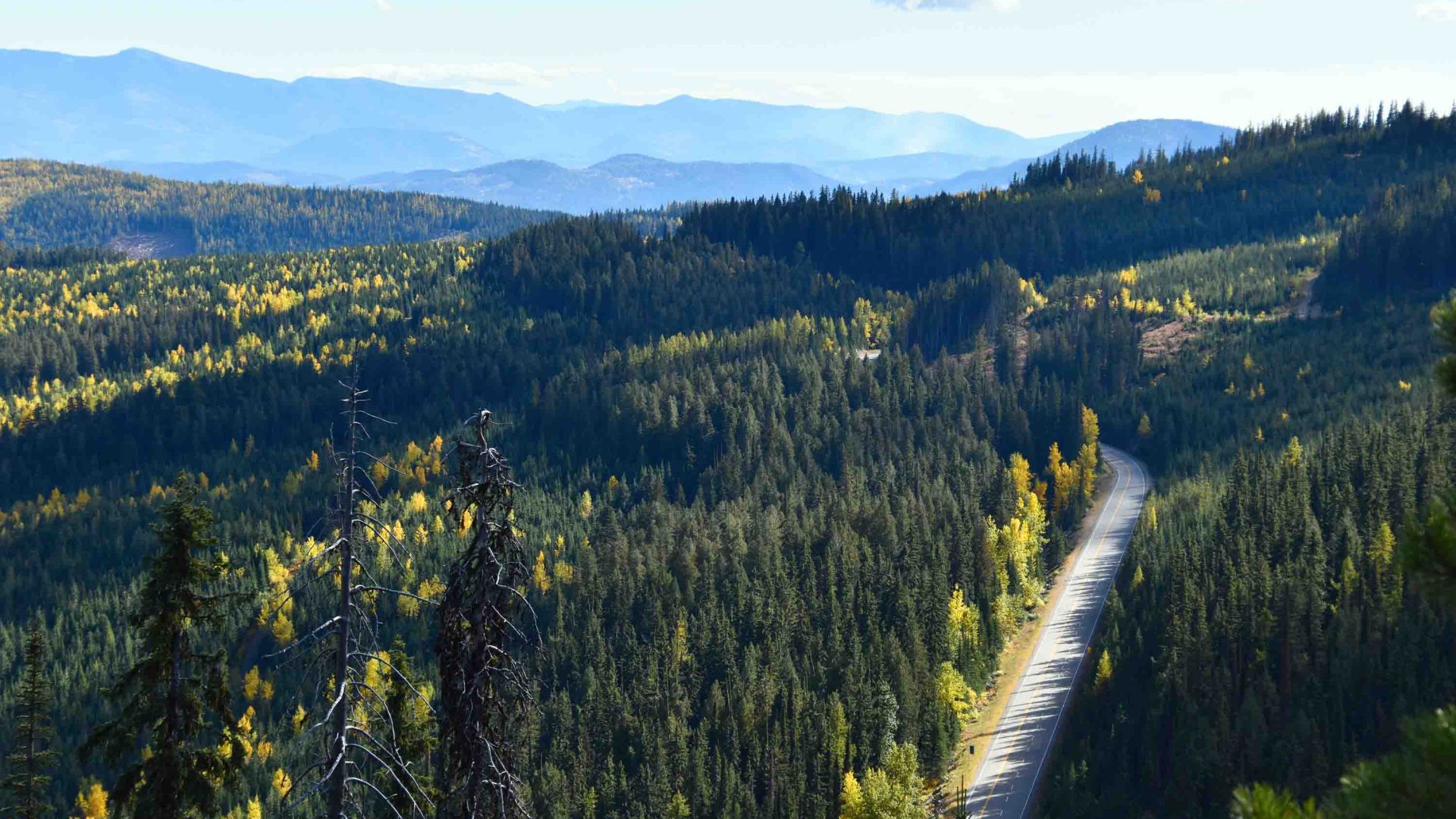
With increasing anxiety ahead of (and after) a pivotal national election in an increasingly polarized world, Brandon Withrow turned to the one place he knows can help him, now and in the future: The forest.

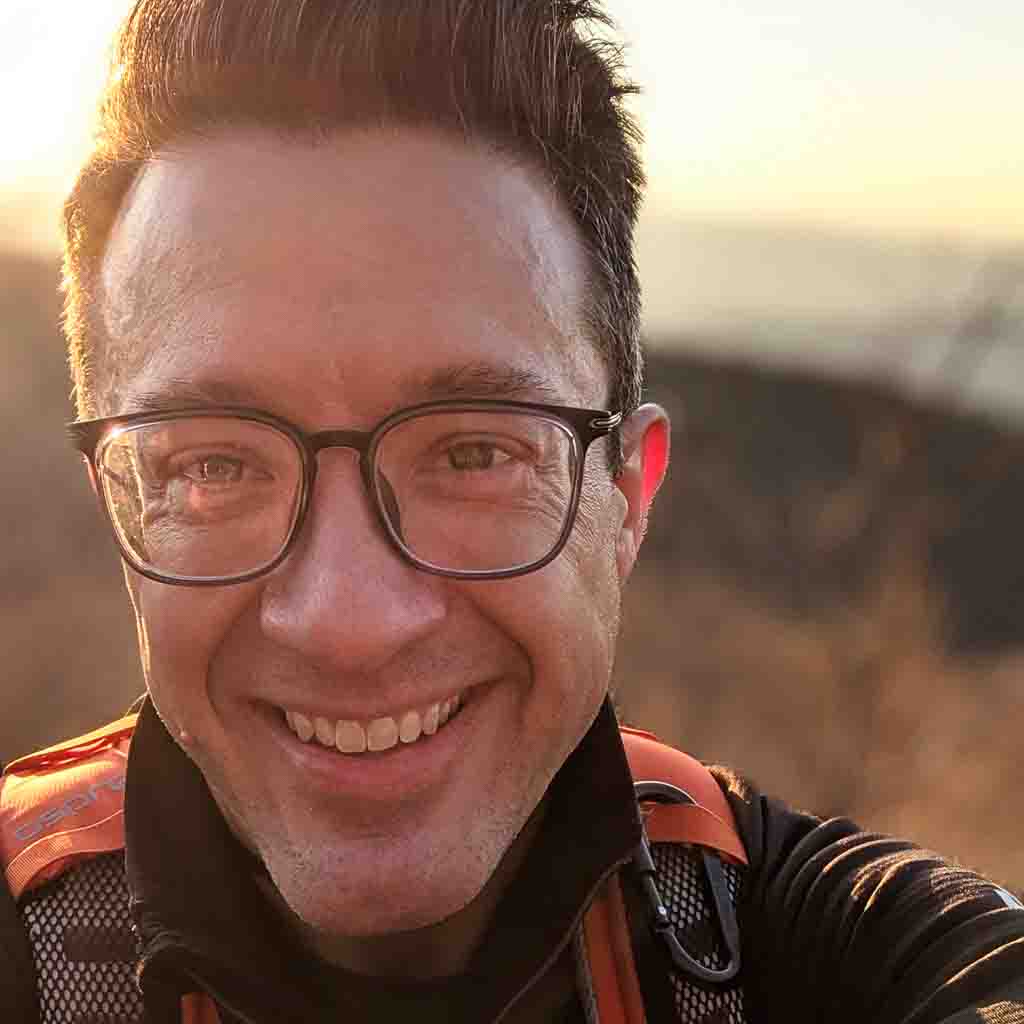
With increasing anxiety ahead of (and after) a pivotal national election in an increasingly polarized world, Brandon Withrow turned to the one place he knows can help him, now and in the future: The forest.
We had just finished dinner when my friend Viktoria North disappeared from the table. Like the angel Gabriel at the Annunciation, she suddenly returned with news for our guide Heidi Korven and me: The Aurora Borealis was directly above.
Full and a little sloshed, the three of us scurried up the quaint main street of Rossland, British Columbia, chasing a ballet of northern lights across the sky. We laid down on the cold asphalt, laughing like kids, as we watched the dance of spinning greens and pinks.
“What did we do in a previous life to deserve seeing this together?” asked Viktoria. “I wish I was on some Scooby Snacks [psilocybin or magic mushrooms] right now!”
“What is even happening?” shouted Heidi in disbelief—the northern lights are a lot rarer here than further north in Canada.
This was my final night in the Kootenay Rockies, easily the most underrated region in the Canadian province of BC. It was also one of the most relaxing weeks of my year—and I needed it. I had arrived a month before the recent US election, and my baggage was full of anxiety.
I was in Canada to explore the forest trails and soak up the mountain air. I’d long discovered that the best way to handle stress is through a forest hike—I bring my baggage to the forest, and it acts like a porter, taking it off my back.
This release is a benefit of forest bathing, also known as forest therapy, or by its Japanese name, shinrin-yoku. It’s the idea that physical and mental wellness can be found by immersing oneself in nature.
Just 15-20 minutes into the woods goes a long way for reducing stress, though studies are showing two hours is optimum if you want the full benefits. And I need all the benefits I can get, depending on the upcoming election results and my country’s impending, dark turn.
My Kootenay journey started at the nearest airport city, in Spokane, Washington, set in a valley surrounded by ponderosa pines and Douglas firs. The two-hour drive to the Canadian border is a beautiful mix of Washington mountains and streams—the perfect pre-Canada aperitif. A friendly Canadian border guard welcomed me in the most Canadian way possible: With jokes and tourism tips.
And just like that, I left America. I felt relieved.
My first stop was Nelson, a foodie paradise and quirky small city with laid-back mountain life, where I’d arranged to meet up with Viktoria. We’d become friends before the pandemic and hadn’t seen each other since. Grabbing ebikes from Electric Larry Land’s rental, we rolled through town, visiting breweries and catching up.
The next day, we went hiking along the White Queen Loop on Mount Beattie in Nelson, surrounded by jaw-dropping mountains, though the trail to the summit is mostly a dusty, pitted ski hill road. Near the top, it becomes a single-track hiking trail weaving between boulders, occasional bear scat, and huckleberry bushes (the berries make an incredible trail snack), ending at a stunning view: The larches.
Larch trees are deciduous conifers that turn from green to a fiery yellow and brilliant gold in the fall before they drop their leaves. That day, they popped like I’d never seen before against the cloudy sky. I dropped my backpack, grabbed my water bottle and camera, and settled in behind a boulder to sit and soak it all in. This is why I was here: To bathe in the forest.
Of course, there’s no bathing; it’s about soaking in the health benefits of the forest. Japan has long promoted forest therapy by creating nationally designated trails for that purpose, and Canada’s doctors have prescribed forest therapy for their patients for good reason.
What’s so special about the forest? Over the last 20 years, scientists have reached the same conclusion: being outdoors has health benefits. Humans spent “more than 99.99 percent of our evolutionary history in natural environments,” wrote Yoshifumi Miyazaki, the pioneer of forest bathing research in Japan. “We are essentially adaptive to nature.”
There’s a reason forest bathing has so many health benefits like reducing stress and anxiety, lowering blood pressure, and improving the immune system. As trees release phytoncides into the air, a chemical compound that is antimicrobial, fungicidal, and helps defend against insects, our bodies react to it. We humans know it by smell—the lovely scent of a pine tree, for example. The research shows a connection between breathing in phytoncides and the body’s ability to raise the numbers of natural killer immune cells (or NK cells), a type of white blood cell that can assist in fighting viruses and cancer.
To survive my country’s dark turn, I know I’ll need to return to the forest again and again. Over the next four years, it will be a place to find my anchor, to refuel my soul, and improve my physical health.
You don’t have to go to Canada to get this. Just 15-20 minutes into the woods goes a long way for reducing stress, though studies are showing two hours is optimum if you want the full benefits. And I need all the benefits I can get, depending on the upcoming election results and my country’s, impending, dark turn.
“He can’t really win, can he?” Viktoria asked me.
“Have you met us?” I replied. I desperately needed the forest.
My country’s current affair with openly fascist leaders is unfathomable to me. How could one become President? Again? This also felt extraordinarily personal. Not only did I have to wonder if reproductive rights of women would be protected, but I had to face the fact that many of my evangelical Christian family members were voting for someone whose behavior and ideas seemed counter to everything they say they stand for morally.
Later that night in Nelson, we met up with Heidi, and the next day, made our way to Ainsworth and Kaslo on the Kootenay Lake for the Kokanee Old Growth Cedars Trailhead. It’s not a long trek, but has everything you crave from nature: The sound of rushing water, wind blowing through the treetops, stump nurseries making way for the next generation of forest, and the ultimate prize—a cedar grove of massive primary forest trees more than 800 years old.
I finally felt my mind let go.
We followed this with a short hike to the grotto of Fletcher Falls, where I filtered my anxieties through the white noise of tumbling water. I ended the day by soaking in silence at the fire watch station of Buchanan Lookout—you don’t always know how busy your daily soundscape is until you find silence.
The peacefulness was accompanied by a rippling sea of mountain peaks, endless forests, and misty rains in the distance that dimpled Kootenay Lake below. There were stops between these moment, like the Indigenous-owned, Ainsworth Hot Springs Resort, and Seven Summits Trail, and when we finally arrived at Rossland, we were met with a wonderful forest hike that rises to a peak overlooking rolling hills below, and within visual range of the States.
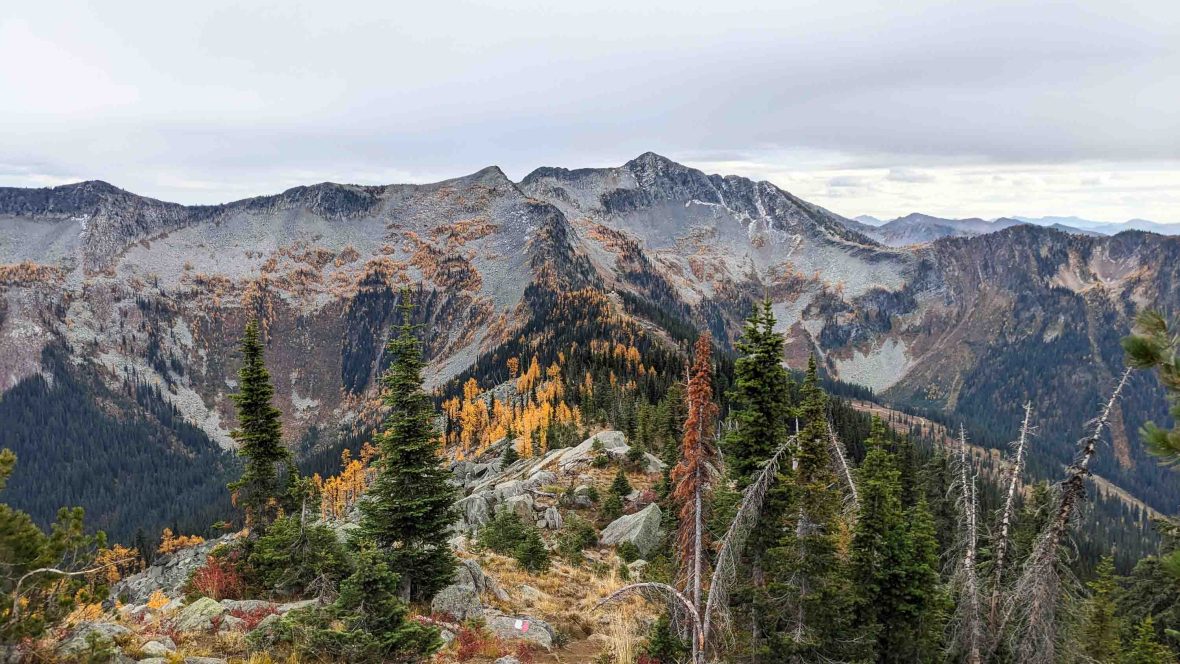
That final night, after we stumbled away from the northern lights and to The Wild Turkey Inn, a historic Victorian-era B&B down the road, I fell into my bed and slept like a baby. The next morning, we said goodbye to Rossland with one last hike. Heidi led us up to a summit view of the small town resting in fall colors below. It was perfect. I knew I would miss it. I said goodbye to my friends and started the drive back to Spokane.
“What business were you on?” “What do you do for a living?” “How long were you visiting?” “Pop your trunk.” A US border guard circled my vehicle, offering zero jokes or tourism advice.
I left Canada.
A month later, back home in Ohio, no amount of optimism could prepare me for the election result. To survive my country’s dark turn, I know I’ll need to return to the forest again and again. Over the next four years, it will be a place to find my anchor, to refuel my soul, and improve my physical health. I don’t think it matters what challenges you’re facing. Health concerns. Job stress. Family conflict. The anxiety around world events and watching fascism spreading across the globe. But whatever it is, I’m prescribing the forest.
****
Adventure.com strives to be a low-emissions travel publication. We are powered by, but editorially independent of, Intrepid Travel, the world’s largest travel B Corp, who help ensure Adventure.com maintains high standards of sustainability in our work and activities. You can visit our sustainability page or read our Contributor Impact Guidelines for more information.

Brandon Withrow is a travel journalist from Ohio. His writing focuses on outdoor adventures, conservation, Indigenous stories, road trips, and underrated cities. When he’s not writing, he’s cycling, hiking, or attempting to mix cocktails, but never all at the same time. He has written for BBC, National Geographic, Canadian Geographic, Sierra Magazine, Virtuoso, The Hill, The Daily Beast, Insidehook, Wanderlust, and others.
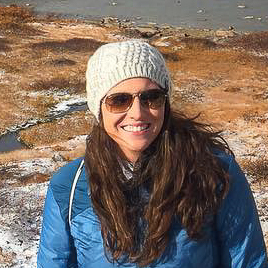

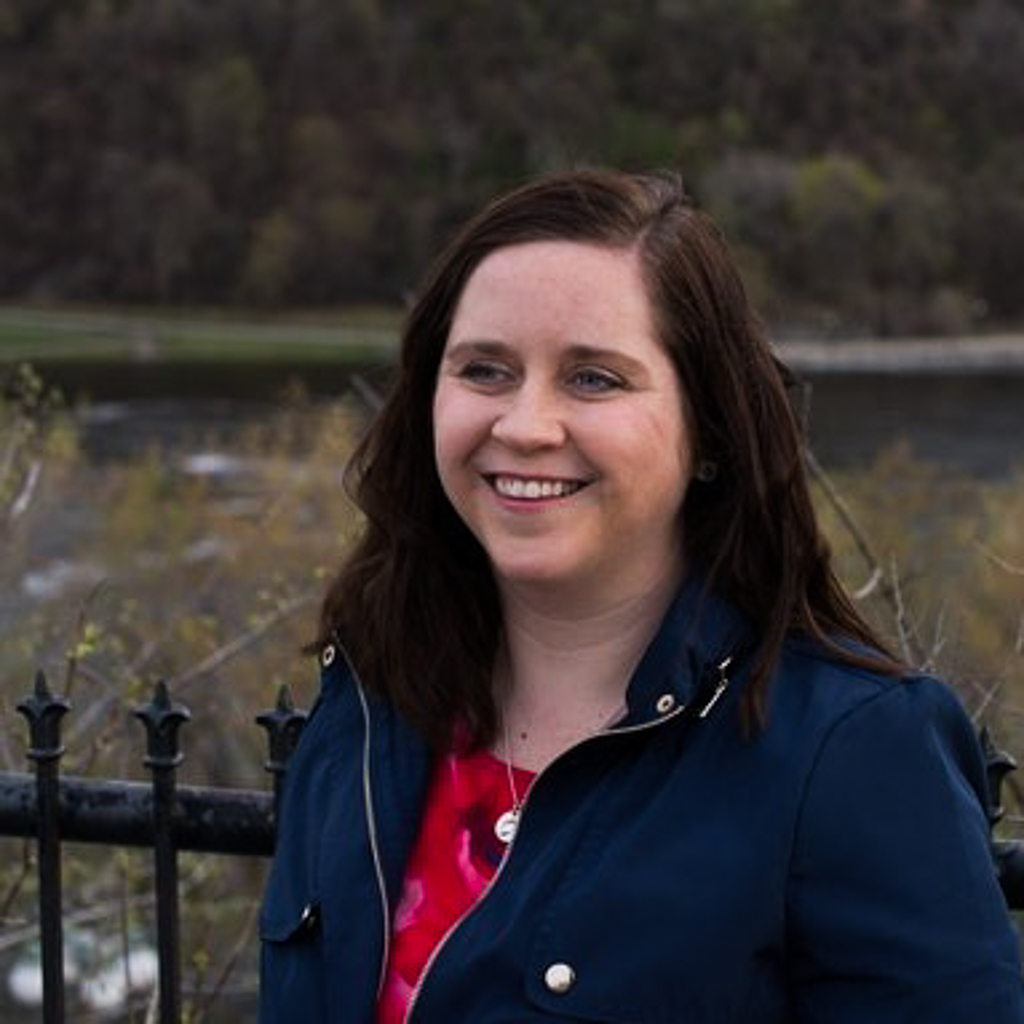

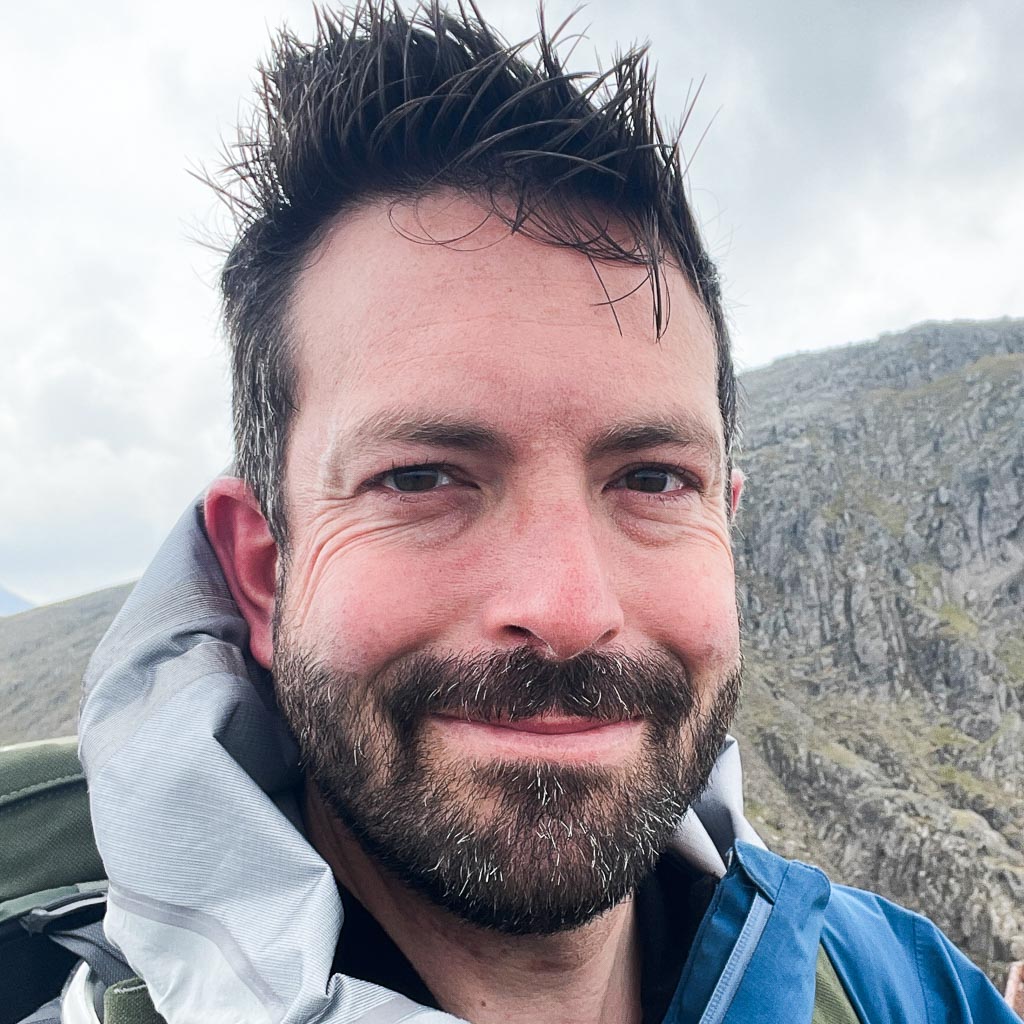



Can't find what you're looking for? Try using these tags: